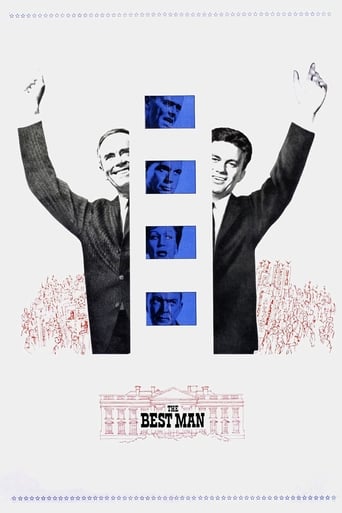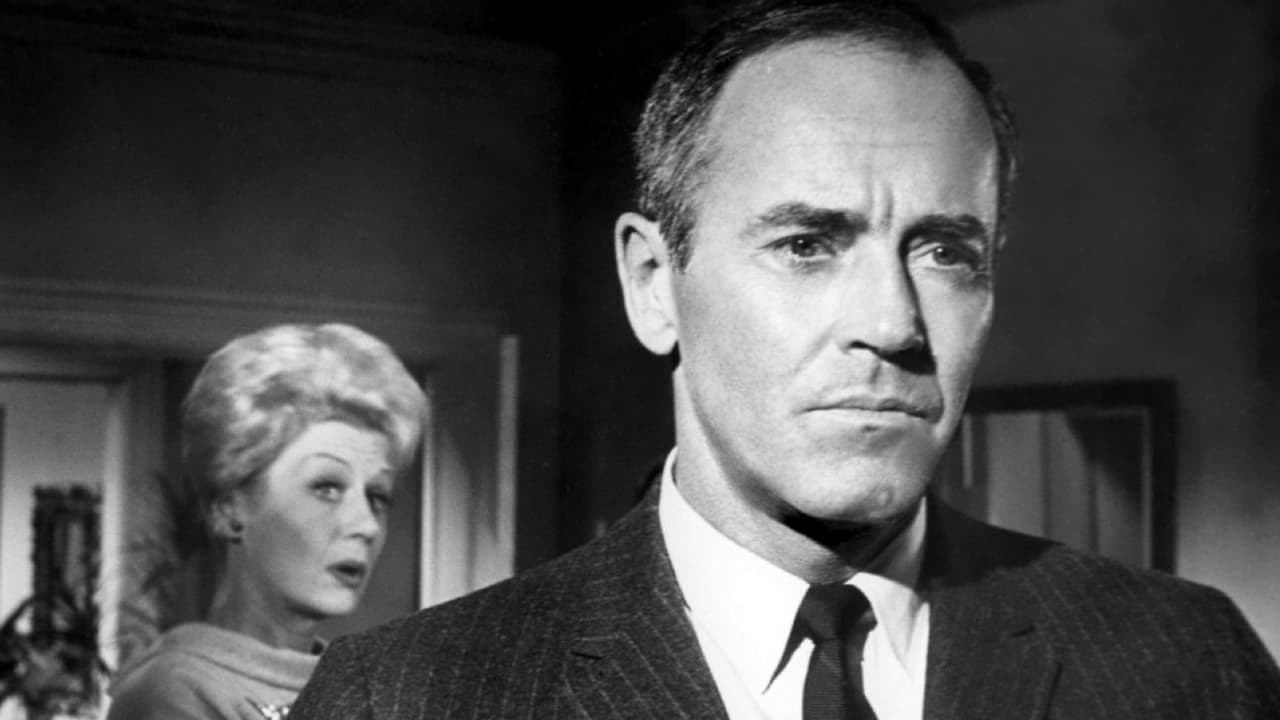billcr12
The Best Man is from 1964 and it could have been made today. Gore Vidal first wrote it as a play which he later adapted for the screen. Vidal had real life experience as an insider in politics. He was on a first name basis with JFK. Henry Fonda stars as an idealistic politician running for president. Cliff Robertson is his opponent in a primary before the election. The man has no scruples and will do anything to win the election. The wheeling and dealing are shown in a very realistic manner. Vidal's script cuts like a razor sharp scalpel. More then fifty years later and nothing has changed. We need more Gore Vidal's today to cut through all the BS.
John Brooks
Henry Fonda is the honest aspiring presidential candidate. Clifford Robinson is the social climber. But with the way the characters are written, we're given just about enough realistic nuance to make this more interesting than it would seem classically drawn on paper.It's a good film in that you may not be a natural fan of this sort of film, and yet, it isn't a boring old political film. Yes it's dialog-based, politically/morally centered, but it's well constructed, and the characters are really well written enough that the film as it progresses keeps captivating its audience.The whole effort culminates into the final scene. An interesting outcome. Good stuff. 7.5/10.
SnoopyStyle
In a Presidential convention, William Russell (Henry Fonda) and Joe Cantwell (Cliff Robertson) are the leading candidates. Russell is a principled intellectual with personal issues that could haunt him. His estranged wife Alice is supportive publicly. Cantwell is a populist on the outside, and a ruthless opportunist on the inside. His wife is superficial. They struggle for the endorsement of the departing President Art Hockstader. Cantwell threatens to Hockstader that he would release Russell's secret psychiatric hospital records. In his all important speech, Hockstader doesn't give a direct endorsement throwing the convention open. He has concerns about Russell but vows to stop Cantwell.This is a political movie of the era. The main characters are referencing politicians of the time. It loses a little with the passage of time. Fonda and Robertson are exceptional. Writer Gore Vidal injects the movie with plenty of behind the scenes realism. It is more real than most political thrillers of that era.
dougdoepke
The movie's a cynical look behind-the-scenes at American presidential politics. Conflicted idealist candidate Russell (Fonda) needs just a few more delegate votes to go over the top. But can he play the kind of political hardball necessary to get them. At the same time, ruthless candidate Cantwell (Robertson) won't hesitate to throw dirt from the past to discredit him. Trouble is that Russell will have to lower himself to Cantwell's level to stave off the attack, something that would injure his strong sense of character.Writer Vidal does a good job of dramatizing the conflict between ideals and practical politics. We all respect strong ideals, so Russell comes off as the good guy, conflicted, but basically what we think presidents are supposed to be. What I like is Vidal's questioning of whether ideals are enough qualification for the highest office. That comes about through Cantwell's questioning of whether his opponent is decisive enough to be a commander-in-chief. Of course, Cantwell is nothing if not decisive; he knows what he wants. On the other hand, Russell wavers when confronted with a difficult choice. After all, he's got many more norms than his rival to consider. However, Cantwell points out that such wavering could be fatal for a chief executive in a dire situation. Of course, this important point tends to get lost in the good guy – bad guy colorations between the two chief candidates. But the point is a telling one as it gets reflected in the movie's outcome, when Russell disqualifies himself from candidacy. Note too, that Cantwell is finally undone by the sheer drive that causes him to fatally misjudge Russell's character. After that, the movie leaves off on a rather ambiguous note despite the symbolism of an upward bound escalator. As a result, we're left wondering whether the best man has really won, especially since Merwin, the remaining candidate, remains a cypher.Director Schaffner does an excellent job of capturing the hurly-burly of a nominating convention. Knots of people are constantly bouncing off each other like billiard balls. How anything cogent could come out of such apparent disorder is hard to believe, but I guess it does. Meanwhile, writer Vidal's particular dislikes are also pretty close to the surface, especially as directed toward southern politicians, along with segregationists in general. At the same time, he appears to take the slimy deal making, blackmail, and betrayals, as an orthodox part of politics-as-usual. My only real complaint is with comedian-turned-actor, Shelley Berman. He plays his informer role almost as if it were shtick. His craven mannerisms are more comical than convincing. Too bad, because otherwise the movie manages a persuasive air of realism.All in all, the movie stands the test of time pretty well. Issues like legal segregation have faded, but the mechanics of political deal-making, et al., likely remain in effect. I'm glad the film doesn't take the easy way out by reinforcing good-guys-always-win beliefs, a regular feature of 50's films. Sure, Cantwell comes across as something of a political bad guy. But sometimes, bad guys can say incisive things, as Cantwell does here. While good guys, even though basically good, can be too cerebral for the job. And that seems to me an important lesson to note.


 AD
AD






